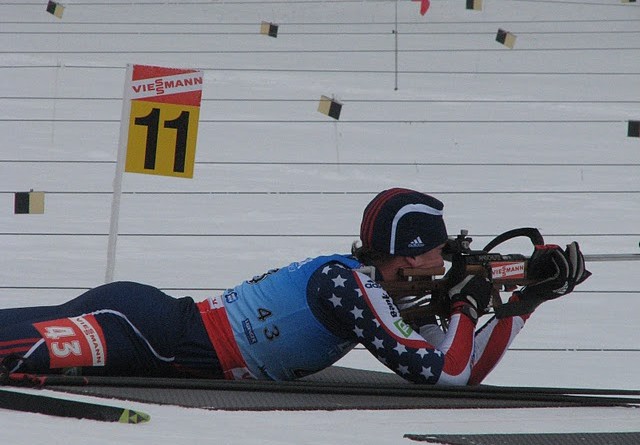Aiming for Victory | Vermont Has Bred Some of the Nation’s Best Biathletes
The sport of winter biathlon in the United States can trace its roots to the celebrated, 10th Mountain Division that distinguished itself in fierce combat in northern Italy during World War II. Veterans of the division returned to the States after the war, and many of them put their ski training to use in civilian life by building ski areas, starting ski schools, and manufacturing ski equipment.
When the United States was awarded the 1960 Winter Olympics, to be hosted at Squaw Valley, Calif., many 10th Mountain Division veterans were involved in the planning and organization of those games. For the first time since the original, 1924 Winter Olympics in Chamonix, France, events combining cross-country skiing and rifle marksmanship were on the official program.
Anticipating the 1960 Olympics, the U.S. Army recognized the marketing value of biathlon, and in 1958, established a training center for the sport at Fort Richardson, Alaska, on the outskirts of Anchorage. Promising athletes from across the country, who had been drafted or had enlisted in the service, found their way to Fort Richardson. If fortunate enough to be selected, their military duty consisted primarily of training in skiing and shooting in preparation for major biathlon competitions in Europe every winter.
The training center at Fort Richardson was closed in the late 1970s, ostensibly as part of budget cuts following America’s withdrawal from the Vietnam War. At roughly the same time, members of the Vermont National Guard were being recruited for key roles in the organization and conduct of the biathlon events of the 1980 Winter Olympics in Lake Placid, N.Y. The success of those games and the enthusiasm they inspired in several of the Vermont Guard members, led to the establishment of a biathlon facility at the Ethan Allen Firing Range in Jericho, Vt.
Over the past three decades, that facility, and the support of the Vermont National Guard have, to a significant degree, filled the void left by the closing of the Fort Richardson training center. The Ethan Allen Biathlon Center boasts one of the finest biathlon competition venues in the country, and has hosted several major events, including international military competitions and Junior Biathlon World Championships. Perhaps equally as noteworthy, the Vermont National Guard facility has inspired dozens of young athletes to try the sport, several of whom have earned national attention.
So it comes as no surprise to even casual biathlon observers that there are at least six international-caliber biathletes who have strong ties to Vermont. We profile them here, along with some of the coaches who make it happen.
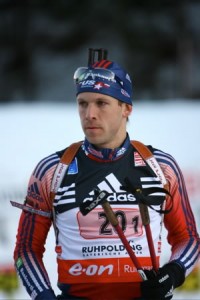
Lowell Bailey, 30, one of America’s top competitors for the past decade, is perhaps Vermont’s most prominent biathlete. Bailey is a veteran of both the 2006 Winter Games in Torino, Italy, and the most recent Olympics in Vancouver. When not traveling the world in pursuit of his sport, Lowell calls Lake Placid, N.Y., home. He interrupted his biathlon career from 2003 to 2005 to attend the University of Vermont. During that time, he excelled for the Catamounts on the Eastern Carnival circuit and earned All-American recognition in three NCAA championships. A highlight for Bailey from last season was contributing to a best-ever, sixth-place men’s relay finish at the World Championships in Russia.
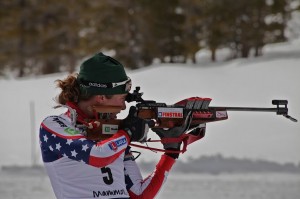
Susan Dunklee, 25, from Barton, made the switch to biathlon after an outstanding collegiate career skiing for Dartmouth College. Dunklee contributed to Dartmouth’s 2007 NCAA Team Championship, served as co-captain her senior year, and announced her conversion to biathlon by winning a National Championship in 2009. Last season she had a ninth place in the sprint at U-26 European Championships held in Ridnaun, Italy, and a 10th-place finish at a January International Biathlon Union Cup sprint in Altenberg, Germany. She has Nordic skiing in her blood. Her uncle Everett was an outstanding collegiate racer for the University of New Hampshire in the late 1960s, and her dad, Stan Dunklee, competed in the 1980 Winter Olympics in Lake Placid, placing as the top American in the 30-kilometer event and contributing a strong leg to the United States’ solid, eighth-place finish in the 4-by-10-kilometer relay. Susan is a member of the U.S. Biathlon Association’s National B Team for the 2012 season based on last year’s performance. Recently, she qualified, based on rollerski biathlon races this summer and fall, to represent the United States at international competitions with five other women. Part of what makes Dunklee unique is that she splits her time on the national team (based in Lake Placid, N.Y.) and her local ski club (Craftsbury). You can follow her progress on Facebook.

Katrina Howe also makes our list by virtue of attending the University of Vermont. Twenty-five-year-old Howe grew up running and skiing in Guilford, N.H., under the guidance of the Gunstock Nordic Association. While at UVM, she had impressive results, especially in collegiate winter carnival skate races. She represented the Catamounts in three NCAA Championships. In the summer of her sophomore year, she participated in a Nordic training camp at the Ethan Allen facility in Jericho, and was introduced to biathlon. Following graduation from college in 2009, Howe was named to the U.S. Biathlon Association’s Development Team. Since then she has been improving her biathlon skills and gaining valuable competitive experience. Howe’s major at UVM was athletic training, so her near-term goals as a competitive biathlete might very well provide on-the-job experience for a career in coaching or sports medicine.
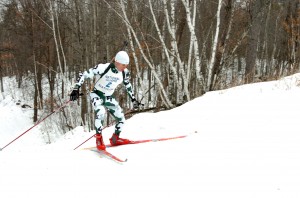 Second Lt. Samuel Morse, 28, is a member of the Vermont National Guard who hails from Camden, N.Y. Morse earned a position on the USBA’s Summer Biathlon National Team by winning all three events at the 2009 National Championships in Lake Placid, N.Y. His outstanding performance there resulted in a trip to the Summer Biathlon World Championships in Oberhof, Germany, where he finished in the top 10 in the sprint and 13th in the pursuit. While clearly world class in running shoes and shorts, Morse is no slouch in the winter, on snow. In 2008, at the National Guard Bureau Biathlon Championships at Camp Ripley, Minn., he won the 10-kilometer sprint and took silver in the 20-kilometer event. More than 75 Guardsmen and women representing 18 states participated in the championships.
Second Lt. Samuel Morse, 28, is a member of the Vermont National Guard who hails from Camden, N.Y. Morse earned a position on the USBA’s Summer Biathlon National Team by winning all three events at the 2009 National Championships in Lake Placid, N.Y. His outstanding performance there resulted in a trip to the Summer Biathlon World Championships in Oberhof, Germany, where he finished in the top 10 in the sprint and 13th in the pursuit. While clearly world class in running shoes and shorts, Morse is no slouch in the winter, on snow. In 2008, at the National Guard Bureau Biathlon Championships at Camp Ripley, Minn., he won the 10-kilometer sprint and took silver in the 20-kilometer event. More than 75 Guardsmen and women representing 18 states participated in the championships.
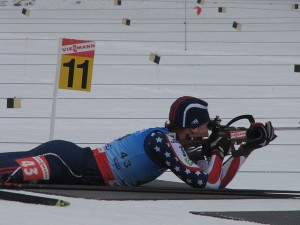
Ethan Dreissigacker, 20, is a third-year student at Dartmouth College, and a member of the Big Green’s powerful ski team. Dreissigacker grew up in Vermont’s Northeast Kingdom skiing at the Craftsbury Outdoor Center. Like Dunklee, Dreissigacker has an impressive athletic heritage. Both of his parents, Dick Dreissigacker and Judy Geer, were members of Olympic rowing teams. Although the family maintains strong ties to rowing through their business, Concept II, in recent years they have been a presence in Nordic skiing, as well. Ethan has earned the distinction of representing the United States in two Biathlon Junior World Championships, and is poised to do well when he advances to the senior ranks.
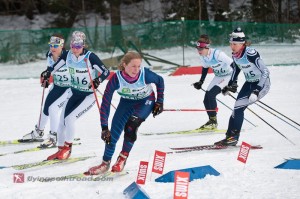
Tara Geraghty-Moates, 18, is an independent-minded young woman from Fairlee. Choosing to be home-schooled rather than attend conventional high school, Geraghty-Moates also was fascinated by the historically male-dominated sport of ski jumping. Even before completing her secondary school studies, Geraghty-Moates was gaining recognition in both special jumping and Nordic combined (cross-country and jumping). When an injury jeopardized her future as a ski jumper, she entered a biathlon race in spite of extremely limited experience with marksmanship. Her strength and speed on her skis was enough to compensate for her missed targets, and she was selected to represent the United States at the World Junior Championships in the Czech Republic. She finished her season by traveling with the New England Nordic ski team to the Junior Olympics, a gathering of the top cross-country skiers from Maine to Alaska. As Geraghty-Moates’ shooting becomes more consistent, her biathlon results, both nationally and internationally, will improve significantly.
Supporting these athletes, and others from across the nation, are three additional Vermonters with important roles in the USBA.
Dr. Ed Merrens of Norwich has volunteered his time as the U.S. Biathlon Team physician since 1998. As a former Dartmouth College ski team member, Merrens said he understands and relates to the competitors on a level impossible for a non-athlete. In the intensely complicated and complex world of international, endurance sport, Merrens guides the American biathletes through the demands of their year-round training regime and the exhausting schedule of the World Cup race circuit.
Algis Shalna was a member of the Soviet Union’s gold medal-winning biathlon relay team at the Sarajevo Winter Olympics in 1984. Following the break-up of the Soviet Union, Algis brought his family to the States and began a coaching career that has lasted more than two decades. After years of traveling the winter world with the U.S. World Cup athletes, including coaching duties at several Olympic Games, Algis recently assumed responsibility for the development program, providing young, promising athletes like Tara Geraghty-Moates the solid fundamentals that will allow them to succeed at the elite level.
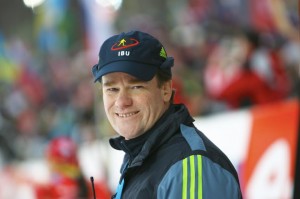
Finally, Max Cobb of Westford has spent most of his career advancing through various positions within the U.S. Biathlon organization. He has progressed from an assistant coach and waxing technician back in the late 1980s to his current position of president and CEO of the USBA. Additionally, Max earned the respect and admiration of biathletes, coaches and administrators from around the world in his role as chief of competition of the biathlon events at the 2002 Salt Lake Olympics. The future is bright for American biathletes in no small part because Max Cobb is running the show.
As the winter of 2012 unfolds, Vermont can be proud of the contribution made by its biathletes and those with strong ties to the state.

